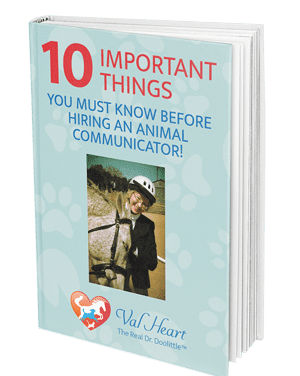10 Things You Must Know BEFORE Hiring a Professional Animal Communicator

You’re looking for a really good, qualified professional animal communicator? That’s great! I first wrote the 10 Important Things You Must Know BEFORE Hiring a Professional Animal Communicator report because I way too often hear from people who have enlisted the aid of a professional animal communicator only to be disappointed in the results of their session.
What do you need to know before hiring a professional animal communicator?
There can be many reasons for that, which I’ll explain below, all of which are avoidable with a little education.
Today you can learn how to avoid making hiring mistakes, and to help you find a great professional animal communicator who will serve you and your pet to the highest good.
Here’s what you need to know.
Telepathic animal communication is a fascinating field and is currently practiced by millions of people the world over! But finding a really good, quality professional animal communicator who you can trust and who can connect really well with your pet to help you solve problems? That is what you’re really looking for.
To help you get started, and to receive the most benefit from professional consultation, there are some critically important things you need to know.
If you have any questions or comments, please let me know.
Animal whisperers, also called professional animal communicators, are a hot topic these days.
While it’s wonderful more and more animal lovers are recognizing that animals are sentient, intelligent, feeling beings, there is a lot of miscommunication out there about what professional animal communicators actually do and how to find a good one, and even when you should hire one to help you.
This Special Post covers:
- What telepathic animal communication is and how it works…
- When and How to be skeptical…
- When to use the services of an animal communicator…
- What to look for when you interview prospective professional animal communicators…
- How to select a good professional animal communicator…
- What to expect from your session…
- Addressing the issue of Lost or Missing Animals…
- And much, much more….

You know your animals have secret lives, thoughts, feelings, and wisdom.
Professional animal communicators are trained to be able to hear them, understand them, and communicate with them so they share their innermost thoughts and feelings.
Animal communication has become really mainstream these days as more folks are aware of telepathic communication between humans and animals. In fact, it is currently practiced by millions of people the world over!!
That doesn’t mean they are all professional animal communication consultants. It means that every animal lover – layperson, caretaker, owner and professional — can learn how to listen and communicate better with their animal companions.
But before you go any further, you need to know some critically important points to consider.
Because this is such an unusual profession, I want to help you get started right.
First you should know who I am and why I’m qualified to teach you about this
I began working professionally as an animal communicator in 1993. I have managed a successful practice working with well over 10,000+ animals and their people, trainers and even veterinarians all over the world. My job is to guide them to accomplish their goals with health, performance, training & behavior modification.
I am an empathic animal behaviorist, a professional animal communicator, a bestselling author and have been a columnist, seen in the news and on tv.
My specialty is in solving problems with pets including alternative healing modalities, mentoring and coaching for both animals and people.
But that’s not always the case with every professional animal communicator – we are not all created or trained equally.
A lot of folks come to me after having worked with other communicators… and they’ll tell me things like: they only were told what they already knew, it wasn’t helpful, nothing changed, or worse, they were told things they knew weren’t true…
Needless to say, they were not happy with their experience.
Some people took their experience as proof that animal communication doesn’t work, that it’s just foolishness or worse, a scam or quackery!
When in fact, they just had a bad experience, or, what happened didn’t meet with their expectations in some way.
Others are still hopeful that there might be something to this, and they still need help — so they are willing to try again.

What Do You Need to Know About Animal to Human Communication, and How Will This Help You With Your Animals?
If you see your animal has a problem, how do you know what is really going on unless you communicate directly with them?
That’s why if you go to a vet or a trainer before you have a discussion with them, you can actually hurt them! They may wind up being misdiagnosed or mistreated because they could be in reaction to an emotional, mental or management problem that has nothing to do with a physical problem.
Animals are exceptional creatures; always trying to communicate with you. They are happy to share how they feel, what works for them or doesn’t, whether they are in pain or are confused. They often have messages for us to help us improve our lives, sharing insightful wisdom from their unique perspective and viewpoint.
When things go wrong for your animal, they try to tell you.

Unfortunately, most people are not trained or experienced in receiving these messages, so they are unable to understand how to provide the love, care and optimal health that their animal deserves. You do your best, but sometimes it’s just not enough.
Did you know your personal relationship with your animal dramatically affects the success and outcome of their long term health and overall well-being?
You know that your animal tries to tell you things every day. But what if you don’t know how to spot a bad habit that comes from a reaction to emotional trauma? Or whether they are experiencing physical pain, illness or discomfort?
Even the most caring, loving owners mistakenly do things all the time that adversely affects their animals.
Have you ever called in the vet only to discover that, try as they might, your vet doesn’t have a clue what’s going on? That’s often because it’s not the animal’s issue, it’s the person’s, their rider’s or caretaker’s issue. OR, it’s because no one took the time to listen to the animal first so they can tell us what we need to know.
I’ve worked with thousands of horses and dogs along with a lot of other animals, and I will tell you that the answers you’re seeking are going to be in one of four areas:
Here’s the outcome of that story.
You take them to the vet and they’ll get misdiagnosed or worse, and you’ll spend a lot of money in vet bills. And you’ll be no better off than if you hadn’t gone, and sometimes actually worse off because the real problem got missed and now your animal has even more stress to deal with.
What if the real issue is something going on in you that is causing distress in your animal?
Without communicating with your animal first, you’ll take them to the vet and maybe you’ll get lucky and it will clear up anyway, but the truth was it wasn’t ever about the animal, it was a problem with you.
That’s why enlisting the aid of a high quality, expert professional animal communicator is so critically important! And, why I’m so glad you are interested in finding a trained practitioner to assist you.
The truth is, not all professional animal communicators know how to resolve problems.
Whether you choose to work with me or not, be sure and seek a practitioner who can best assist you with what you really need and want.
Animal Communication Works Using Telepathy

So what is Telepathic Animal Communication really all about? How does it work?
First off, let’s define TELEPATHY because animal communication works using telepathy, one of your intuitive gifts and abilities.
A common definition of telepathy is the ability to know what is in someone else’s mind or communicate with them mentally, without using words or other physical signals.
The word itself is made up of two terms, Tele – like telephone, meaning hearing over a distance, and Empathy – meaning feeling someone else’s emotions or energies. So literally, it means “distance feeling”.
Start resolving any problem by inviting your animal’s participation, giving them a voice. They can tell us how they feel, when the problem started, what helps, what makes things worse, and what they really want or need… Often the answers are as simple as learning to listen to their wisdom, see life from their viewpoint.
When to Use a Professional Animal Communicator
Animal communication is extremely helpful for:
Emotional and Behavioral Issues like fear or phobias, panic attacks, aggression, withdrawal, depression, grief; heal from neglect, abuse, trauma and abandonment…
We can help with Health Issues and Physical Problems by relaying the animal’s input, viewpoint and experience. How they feel, where it hurts, how much it hurts, what makes them feel better and what they need or want are all valid questions that only the animal themselves can relay. Based on what they tell us, the appropriate measures can then be taken to assist them.
Animal communication is also very useful in Preparing an Animal for Surgery or other medical interventions or procedures, like neutering or spaying, and we can help shorten recovery time.
By the way, animal communicators are not going to analyze, diagnose or prescribe anything medically. We leave that to the vet and medical professionals. We can assist, however, by relaying what your animal needs to say, how they are feeling, what is helping, what isn’t…
How would you like to go to the doctor without being able to communicate with them? We can help heal Trauma Situations, such as from injury, shock, illness, death or grief by understanding the animal’s viewpoint, discussing their experiences helps them rebalance themselves emotionally, letting go of the experience, and make new choices for themselves.
We can also enhance and Improve Performance in the show ring by addressing issues, clarifying the rules of the game, and, identifying learning styles which can shorten training time. We can identify unique talents, skills, abilities, and purposes. I got my start working with performance horses and they are a specialty of mine.
What about Changing Family Structures? We can help them adjust to changing family dynamics, preparing for new arrivals or departures, divorce, separation, babies, rescues, death; healthy pregnancy, delivery and postpartum care for both mother and child…
We can do a lot to help with Traveling and Moving situations by helping our animals understand where their humans are going, why their routine is disrupted, explain about business trips and vacations and who will care for them while their humans are gone. We can help reduce or prevent separation anxiety; showing them where they are going and what to expect of a new home. We can also address important physical boundary concerns. Discussing situations with them beforehand allows them to participate in the process and in their own care.
Working with Rescued Animals helps them to: understand sheltering and fostering; identify what they want in a new home (i.e. kids, other animals, gender preferences); adjust to a new family and home helps shorten transition times and accelerates bonding; heal from neglect, abuse, and abandonment. It also helps us humans to understand where they came from, their history/background, and what their experience(s) were.
We can also help with Euthanasia Decisions, and the death and dying process. Death and dying don’t have to be as traumatic or painful as they commonly are in our society. We can help by offering support for you both through the dying process. Understanding and honoring your animal’s needs and your own can be so very helpful in finding peace and completion through the death of other family members as well. Remember that animals grieve the loss of their fellow animals, and their human friends, too.
Sometimes after we open up the conversation, we then have to go to work resolving the problem! That may mean lifestyle changes, diet changes, training or management modification, behavior modification – yours as well as theirs!!!
There could also be negotiating – I’ll do this if you’ll do that. Most problems in my experience stem from the human’s behavior, lack of leadership skills or clarity about what you really want, giving out mixed signals which create confusion or misunderstanding.
What Animal Communication is NOT!
It is not mind control.
Communicating with an animal doesn’t make them do what you want them to do. They always do what makes sense to them from their viewpoint, given their experiences, their background and history.
Behavior that persists is being rewarded in some way. What you DO sometimes speaks louder than words – especially with our animals.

Which Mistakes Are You Making With Your Animals?
Animals live long lives and most folks intend to give their animals a forever home – after all, our pets are like our children! But the fact is that millions of animals are adopted or purchased every year, and about 40% of them wind up at shelters, dumped, given away (again), on the street, or are euthanized because, through no fault of their own, they simply weren’t right for the job or were misunderstood!
People don’t mean for things to go wrong with their animals… but they do, all the time.
And that’s where a good qualified professional animal communication practitioner comes in to help you sort things out.
So How Do You Find a Really Good Professional Animal Communicator Practitioner?
Here’s what you need to know:
1) Realize that not all communicators are created equally!
Or trained equally either for that matter. It takes many years of practice and seasoning to be a good animal communicator. And often, just being able to communicate does NOT make a good animal communication consultant!! Some of us are excellent at some things, and not so good at other things.
We are doing our best to help you but may not know how to resolve the problem or have enough experience.
I think it’s best to find someone who has a lot of experience. On the other hand, if you choose to work with someone who is fairly new to the work, be willing to give them a chance and be very honest with them about how they are doing. We all had to get started somewhere!
2) No one can make your animals change if they don’t want to.
And, sometimes the problem isn’t with them – it’s with YOU or your family, their situation, their management, their diet, background, breeding or training – or lack thereof! They always do what makes sense to them – from their viewpoint. Our job is to discover FIRST what their viewpoint is, then to work with them to resolve the problem.
3) Understand what the job actually is: animal communicators are trained to listen, telepathically, to animals.
This isn’t rocket science, it is a very subjective kind of work, and we do often make mistakes even though we are doing the best we can at any given moment. We are not clairvoyant (usually), we do not predict the future, we don’t know everything (not omniscient). We are also not intending to read your mind – only your animal’s.
We should be able to accurately understand what your animal is feeling and thinking, what the main issues are from their viewpoint, and be able to present something useful – whether it’s confirmation of what you may already know (which is valuable in itself), uncover new information you didn’t know before, provide clarity regarding the right direction to proceed with the problem, and be able to answer your questions to the best of our ability.
Ultimately, we may not be able to fix your problem. Some problems simply aren’t fixable. If they do not want to change or see no need or reason to change their behavior that they can agree with, then they won’t. You live and work with them 24/7/365. To expect a stranger who they don’t know to make them be different when you continue to reinforce their bad behavior by rewarding it or not making the effort required to teach them anything differently is not realistic.
4) What about skeptics?
I encourage people and my students to be skeptical. You should listen and observe with your heart, but not be so open minded that your common sense falls out!! Not everything that we receive telepathically is going to be 100% accurate — it’s unrealistic to expect it.
The best psychics in the world, at their very best, are only about 80% accurate! However, we can observe results and change. Is there a change in the animal’s behavior, mood, or well-being? Or, how they respond to you or their environment? Often they will, just through communicating with them. Some of us do better than 80% at times, and sometimes we are off.
Expect it.,,, Nobody’s perfect and that includes your veterinarian, doctor, trainer and any other professional practitioner in any field or practice. It is ultimately an intuitive art, and not everyone does it the same way. Some professional animal communicators are simply better than others.
5) And that leads us to what you should do if something feels off in your session.
If something feels off or you are being told things you know are not true — then Please! Speak Up!! Let us know!
Don’t worry about hurting our feelings. We would much rather learn from your honest feedback, and be allowed to correct or explain than have you go away unhappy. If we don’t correct or are unable to, then tell us how you feel. It may be appropriate to reschedule to another time (after all everyone does have off days, right?) OR you can call it quits.
A good communicator should not ask for payment when things are obviously not working well.
And that should be apparent pretty early on in the session. Don’t wait until the end of your session, then decide that because one or two things seemed off even though much of what happened was helpful, accurate and useful, that you now don’t want to pay us for our time.
6) The next important point to consider is this: We are all Practitioners!
That means we are PRACTICING! Along with other professional practitioners — including veterinarians, doctors, and other medical professionals. We do our best to assist, given our experience, training, skills & education.
7) Where do you find animal communicators?
Of course, you can ask Google, look for articles, check out their websites, videos, or read books. As I write this, there are approximately 840,000 results for the keywords “professional animal communicator”. So that’s going to take a good bit of time, eh?
You can also ask friends for advice but remember that their experience may not be yours, because their needs and expectations and situation isn’t yours. You are also looking for resonance – who is the best fit for you and your pet?
The best place to start is through Penelope Smith, The Founding Pioneer and Professional Animal Communication Specialist for our generation. Penelope Smith wrote the books that deepened the Human-Animal Kinship around the world! She is the author of many wonderful books, including “Animal Talk” and “When Animals Speak”, was the creator/editor of Species Link magazine.
She has trained probably 75% or more of all the communicators and professional teachers working today!!!
Go to her website and check her Directory
8) Do your research and choose a few professionial animal communicators that appeal to you.
Then check them out. Everyone has their special area of interest and expertise. If you like the look and feel of their website, then contact them.
9) Interview them. Ask them questions.
How long have they been working as a professional animal communicator? Tell them a bit about what you are dealing with. Ask them if they’ve worked with this kind of thing before, and if so, how successful they have been. Ask what kind of preparation is needed for a session with them.
I work with all my client’s long distance over the phone. Because my schedule is booked so far in advance with a waiting list, I only work with a select group of people who meet my qualifications. I then ask my clients to fill out my Human Animal BodyMind Balancing Assessment Questionnaire, send me pictures of their animals, and make a list of questions – whatever you want me to ask or tell your animals – and that’s where we start with your session.
Then you work with me live on the phone conference system. We enjoy real time, interactive discussions with your animals, and it’s an amazing experience! I use my HEART System for Solving Problems with Pets, a 5 step process that solves problems with every animal, every time (you can read more about that on my consultations pages).
I find that using my proprietary methods and engaging you more in the process, we get much better faster results. By the way, you don’t have to put your animal on the phone with me – they can hear me in their head.
This is telepathy after all…
Some animal communicators will go on-site to work with you in person, and others work long distance either with you directly on the phone or will work in a meditative state then get you their notes afterward. Everyone has to find the way that works best for them.
While you interview them, listen to your own heart. IF you feel good with this person, then make an appointment. You want to look for someone that you FEEL GOOD with, and that has experience with the issues you are facing.
10) The last thing you should ask about is their Guarantee.
Do they have any kind of a guarantee for their work? What will they do if things go wrong, or you are unhappy with your session? I have a Guarantee.
If I am unable to establish clear and accurate communication with your animal in the first 15 minutes, then I won’t charge you. And YOU are the judge of that. I cannot guarantee to change your animals or heal them – no one can make that kind of guarantee! However, I enjoy a success rate of better than 90%!
Remember this isn’t mind control! If they don’t want to change, we can’t make them.
Our goal is to offer insight, clarity, and guidance to help resolve problems between you and your animal friends. If at this point all feels good to you, then give them a chance and make an appointment.
How to Get the MOST from Your Session
First, know that some information that comes through your animal communicator you will be sure to understand right away – after all, you know your animal pretty well. You may have been living together for many years, you understand their world and home environment, and for most of us, our animals are part of our hearts. You do have an intuitive knowing of them.
When I work, I start by sharing my impressions of the animal up front so their person, You, can tell me if I am accurately connecting or not.

Next, understand that you may not understand right away some of the information that comes through. This could mean that your animal communicator needs to better explain what they are receiving. But often, this is simply due to the fact that our animals have very different viewpoints from our own. What’s important to us may not be at all important to them!
Another dog or cat or horse or bird would understand what they meant right away – but us humans? We may never truly understand everything that makes sense to them! We can always ask more questions, or your animal communicator may need to explain it better or differently until it makes sense to you.
And last, sometimes things will come through that simply don’t feel right to you. For whatever reason – don’t question your own innate knowing. If something doesn’t feel right – Speak Up! Say so. Let your practitioner know so they can rebalance themselves and try again.
Remember this isn’t rocket science! There is always a chance we can get off. So be sure to let us know your experience, ok? If you will help us here, that will help us make the best use of our time together.

Help With Lost or Missing Animals
I’m often asked to help with lost or missing animal cases. This is a specialty within the professional animal communicator field and for many reasons, these cases can be quite difficult work with. This is not something I feel particularly good at even though I’ve had success finding lost animals in the past.
I refer to cases to people who do enjoy them and do good work in this area.
Here’s what to do if you ever have a loved one go missing – Click Here to Get Help
Success Stories
Is It Time to Enlist the Aid of a Professional Animal Communicator for YOUR Pet?
If there is something wrong or they simply have a message for you, a qualified animal whisperer will help bridge the communication gap between you. That gives you the chance to do what’s needed to correct anything that needs attention in the most efficient way possible before it’s too late.
No more guessing or wondering what the problem is! You now have a clear idea of exactly what the issue is and what the root cause may be as well. That can save you a ton of wasted energy, time and money… and can even save your animal their life and well-being.
The superpower of true animal communication, aka animal whispering, from heart to heart, mind to mind is a life-changing experience.
Do you and your animal friend need some help?
Contact Val for your personal consultation and get started resolving problems with your pet, bonding at a deeper level, and improving your understanding of each other today.
ABOUT VAL HEART:
Val Heart is no ordinary animal communicator. Val fell in love with horses when she was five years old and began her long-term relationship getting to know and understand horses. Her work with horses led to an intensive study in developing her gifts with animal communication and other supporting healing techniques.
Highly trained in advanced, state-of-the-art alternative healing and life-changing coaching modalities, Val helps horses and their people rebalance in body, mind & spirit. Early on, Val discovered that much of what goes wrong with animals is a reflection of or a reaction to their caretaker’s imbalances. Val helps you with not only your animals but also your life. She takes you deeper into your own personal best – a space of well-being, peace, balance, clarity, and greater conscious awareness.
For more information about setting up a personal consultation and to learn how you can resolve the issues with your animals, contact us by clicking here:



